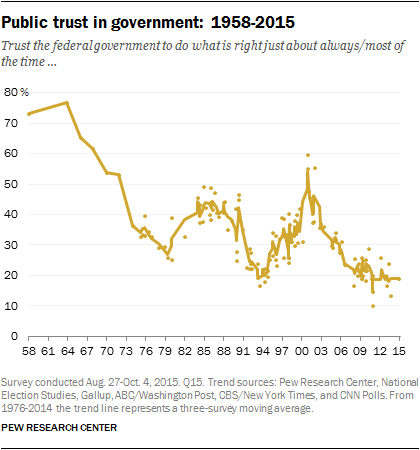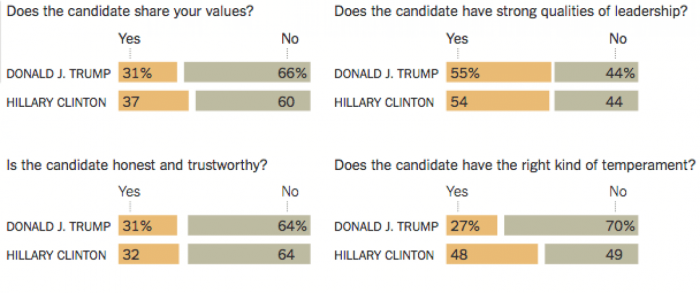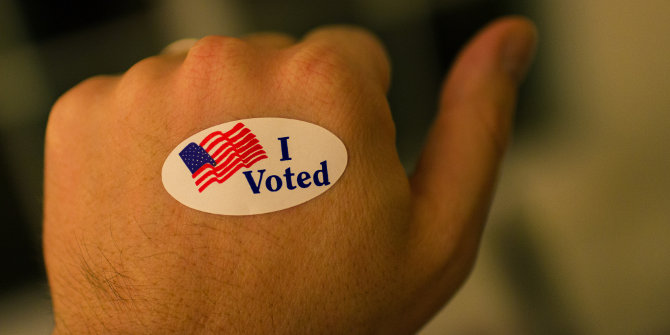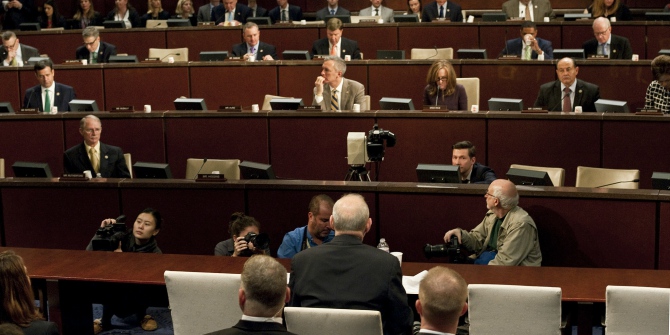 This year’s presidential election has developed in a way that few would have predicted a year or even six months ago. So what can we expect for the fall general election season? LSE US Centre Director, Peter Trubowitz looks ahead to the likely Clinton vs Trump contest, and predicts that the fight for the presidency will center on Donald Trump’s temperament (war), Bill Clinton’s past proclivities (sex) and China’s trading relationship with the US (jobs).
This year’s presidential election has developed in a way that few would have predicted a year or even six months ago. So what can we expect for the fall general election season? LSE US Centre Director, Peter Trubowitz looks ahead to the likely Clinton vs Trump contest, and predicts that the fight for the presidency will center on Donald Trump’s temperament (war), Bill Clinton’s past proclivities (sex) and China’s trading relationship with the US (jobs).
The 2016 election is the gift that keeps on giving. Who would have thought that Donald Trump would be the last Republican standing or that a 76-year old socialist would be giving Hillary Clinton a run for her money in the Democratic race? There are a lot of things you can say about this year’s campaign and one of them is that nobody saw it coming. Few gave Trump or Sanders much of a chance. For its part, the mainstream media consistently got the story wrong.
Fear and Loathing
The frustration and anger with Washington being expressed by voters has been surprising to many, but it’s nothing new. The PEW foundation has been tracking this for a very long time and as you can see, the level of trust in Washington has been declining for some time. Today, only 19 percent of Americans trust the federal government to “do the right thing” and among Republicans, that number is only 9 percent!

What Trump and Sanders have done, and done so successfully, is to tap this frustration and anger, albeit in different ways: Trump by playing on people’s fears and longings for a distant, “Make America Great Again” past; Sanders by appealing to their hopes for a more just and equitable future. For Trump, such populist appeals proved potent enough to make pretty quick work of 16 Republican candidates, some of them very experienced politicians. Having cleared the field, he is now trying to consolidate his hold on the party. Many Republicans are still uneasy with him. Some see Trump as a know nothing; others consider him a huckster; and still others see a proto-Fascist under that red trucker’s cap.
Despite their unease, Republicans will in all likelihood award Trump the nomination in Cleveland without a floor fight. That will obviously help him, but he will arrive in Cleveland in July with some notable liabilities. For starters, only 73 percent of Republicans say they will support him in the fall. Meanwhile, his unfavorable ratings in the general population are high: 79 percent among Hispanics, 72 percent among young people, 64 percent among women, and 57 percent.
Those are pretty damning numbers. Unless Trump finds a way to unite the Republican base and win over some Democrats it could result in a Clinton blowout come November. But I would put the emphasis here on the “could,” because Hillary’s got a numbers problems too. For one thing, her overall unfavorable rating is every bit as bad as Trump’s: 57 percent. In case you’re wondering, this is indeed the first time in recent memory that we have two likely finalists with such high unfavorable ratings.
Why are Clinton’s unfavorables so high? The short answer is white voters, especially white male voters. This is one of the things the Sanders’s campaign has exposed and it is a key reason that Clinton has been unable to put him away. She crushes him among Hispanic and African-American voters, but Sanders has repeatedly bested Clinton among white male voters. Only 73 percent of Democrats say they would vote for Clinton. Like Trump, she has trouble in her own backyard. She too needs to find ways to excite the base and to win over Republicans and Independents who harbor doubts about Trump.
War, Sex, and Work
What does this portend for the fall campaign? Let’s put it this way: if you’re hoping for a repeat of Obama’s uplifting “hope and change” campaign of 2008, you’d better brace yourself. This campaign is going to bring Hunter S. Thompson back from the grave: it’s going to be a campaign full of “fear and loathing.” We are in for something that will be nasty, brutish, and drawn out – scorched earth, no holds barred campaigning by both sides. That is not to say that it will be an issue-less campaign. Rather, it will be a campaign where the boundaries between issues and character are deliberately blurred by both sides. And it’s going to focus on three big things: war, sex, and work.
War
Let’s start with war. The key issue here will not be what to do about Syria, or what really happened in Benghazi, or how to counter Putin in the Ukraine, though each will surely be part of the campaign. The more pressing issue is going to be Trump or more precisely, Trump’s volatile temperament. You may be familiar with Lyndon Johnson’s 1964 ‘Daisy ad,’ a powerful attack run by the Johnson campaign against the Republican opponent, Barry Goldwater. Although it never actually mentioned Goldwater by name, it played on voters’ misgivings about Goldwater’s temperament: it played on fears that he was unpredictable and trigger-happy, and thus too likely to use “the bomb.” Though used only once in the campaign, the Daisy ad is widely considered to have played an important role in Johnson’s landslide victory that year.
Don’t be surprised if we see the Clinton campaign roll out 21st century version of this ad – something that reminds American voters of the stakes involved in the election. Would it work? It could. Whatever voters think about Clinton, one thing they do not think is that she is impulsive and hotheaded. Calculating yes, but not rash or reckless. And if there’s one thing that voters already think about Trump it is that he is reckless and shoots from the hip. That is arguably one of his political strengths (it makes him different from conventional politicians), but it also makes him a risky choice. To put it in Donald Rumsfeld’s terms, Trump is a “known unknown.”
A CBS/NYT poll released last week underscores just how vulnerable Trump is on this score. As you can see, when it comes to who is “more trustworthy,” who is a “stronger leader,” or who shares “your values,” voters see little difference between Trump and Clinton. But when it comes who’s got “the right kind of temperament,” Trump has a problem. Fully 70 percent of those polled don’t think he has the right kind of temperament to be president. Clinton’s team should – and I predict will – hit this hard. Doing so will help bring Bernie’s supporters onside and force those who might vote for Trump holding their nose to think hard about what their vote could mean for their kids.

Source: New York Times/CBS News Poll. The nationwide telephone poll was conducted on cellphones and landlines May 13-17 with 1,109 registered voters. Numbers do not add to 100 because all answer categories are not shown.
By The New York Times
Sex
And what about Trump? Should we assume he sit there and take it? Not a chance! One of the things that makes Trump a vexing candidate for Clinton is that he will run to her right, run to her left, and run straight at her – all at the same time. He will run to her right on immigration, terrorism, and guns. He will run to her left on trade, Wall Street, and NATO. And he will run straight at her by going after her spouse. Indeed, he’s already resurrecting old rumors that Bill Clinton abused, even, in Trump’s words, “raped” women and that Hilary was his “enabler.” This is going to get ugly.
Why in the world would Trump do this? First, it makes it harder for Clinton and her surrogates to make hay of Trump’s own troubled past when it comes to women. Second, if Trump gets traction on this issue, it will keep the “Big Dog” in the doghouse. Bill Clinton is a much better retail politician than his wife and the more the he is kept on the sidelines the better it is for Team Trump. Third, attacking the Clintons helps fire up the Republican base. If there is one thing that works die hard Republicans up into a fever, it’s the Clintons.
Finally, and perhaps most importantly, attacking Bill Clinton reminds voters that it’s Trump not Hillary Clinton that’s the agent of change this election cycle. Donald Trump’s big structural advantage going into this contest is that he is widely perceived as more likely to change “business as usual” in Washington than Clinton is. Look at any of the national polls like the one from the Washington Post last weekend and you can see what I mean. It’s not a huge gap, but it’s where Trump has a decided advantage. Every time Trump slams Bill Clinton he’s reminding voters that Hillary is part of the Washington Establishment.
Work
Okay, so much for war and sex. What about work? I predict that we’re going to hear a lot about the workplace this fall. For her part, Clinton will talk a lot about “equal pay for equal work” – to hammer home the idea that she speaks for women. Donald Trump calls that playing the “woman’s card.” Maybe, but she will play that card over and over again because again, he has a problem with female voters. This gap has closed since March, but he’s still trailing her by double-digits in most polls. That’s a big number in presidential politics.
And what about Trump and the workplace? You can bet your bottom dollar that we’re going to hear a lot about foreign trade in the fall campaign. Trump (and Sanders) has strongly opposed TPP and TTIP, arguing that these kinds of trade agreements have been stealing American jobs and eviscerating the country’s manufacturing base. In his view, America’s trade bargains are making America weak and other nations strong. While some of this is directed at America’s allies, most of Trump’s attacks are directed against China.
In Trump’s view Beijing is eating Washington’s lunch when it comes to trade. Moreover, it’s left America in hock up to its ears in Chinese debt. When Trump is on the stump he promises voters that he’s going to bring home those high-paying jobs that have gone to China, Mexico, and elsewhere. Whatever one thinks of Trump’s understanding of trade, debt, and outsourcing, this cluster of issues probably gives him his best shot at flipping a couple of states in the Electoral College.
For Trump to win, he needs to pick up a couple of industrial states that have trended Democratic in recent elections. Given the type of voter that is especially drawn to him – non-college educated, blue-collar whites – his best bets are states like Ohio, Pennsylvania, or Michigan. If Trump can hold traditional Republican states in the Mountain West and South and pick up one or more of these mid-western states, he could win the presidency. And this is where China comes in.
What Trump has understood from the beginning of the primary season is that free trade and outsourcing are unpopular, especially in these big industrial states where voters have been on the losing end of globalization. In the past, Republican candidates could not take advantage of this at the national level because they have long catered to the interests of Wall Street that favors free trade and foreign investment. This is one thing that makes Donald Trump such an unorthodox Republican candidate.
Bottom line: Trump is going to hit this issue very hard using China as the poster child for what’s gone wrong. Doing so not only speaks to the needs of the many Americans who have lost out from globalization. It’s also a good way to remind voters that it was the Clintons who did so much to promote free trade and foreign investment in China in the 1990s. And don’t be surprised if you see a repurposed version of this ad? It’s not as famous as the Daisy ad, but it is slick and effective. It first appeared in the 2010 midterms, and then in the 2012 presidential race, and then again in the 2014 midterms.
The Obama factor
Of course, war, sex, and jobs are not the only issues that will come up. Given that the next president will likely be making three Supreme Court appointments, the Court will also figure into the campaign. So will Donald Trump’s taxes and Hillary Clinton’s speeches on Wall Street.
And of course there are the “black swans” – a major terrorist attack or an international crisis in say, East Asia. Either could happen and we might even assume something along these lines will in fact occur. At the moment, it’s not obvious how such events would cut politically. A major attack or crisis could help Clinton or hurt her depending on the public judged Obama’s handling of it. Which brings me to a final consideration: Obama.
Many things determine an election outcome: the state of the economy; how long a party has been in power; even the price of gasoline. One factor that has proven especially important in determining a party’s fortune is the sitting president’s job approval rating. Obama’s approval ratings have been in the tank, but he has just reached an important milestone in presidential politics: 51 percent approval. If that number holds up, it could be the difference between a Clinton presidency and a Trump presidency. So keep your eye on that number in the months ahead: it as good a predictor as any of what November will bring.
This article is based on Peter Trubowitz’s Clarendon Lecture, given at the University of Oxford on May 24th, 2016.
Featured image credits: U.S. Department of Defense Current Photos (Public Domain), Susan Ruggles (Flickr, CC-BY-2.0), maisa_nyc (Flickr, CC-BY-NC-SA-2.0)
Please read our comments policy before commenting.
Note: This article gives the views of the author, and not the position of USAPP – American Politics and Policy, nor the London School of Economics.
Shortened URL for this post: http://bit.ly/1NM0u9k
_________________________________
About the author
 Peter Trubowitz – LSE US Centre
Peter Trubowitz – LSE US Centre
Peter Trubowitz is Professor of International Relations, and Director of the LSE’s US Centre. His main research interests are in the fields of international security and comparative foreign policy, with special focus on American grand strategy and foreign policy. He also writes and comments frequently on U.S. party politics and elections and how they shape and are shaped by America’s changing place in the world.






